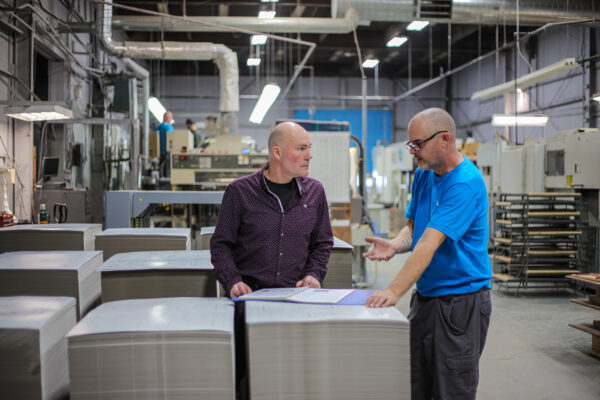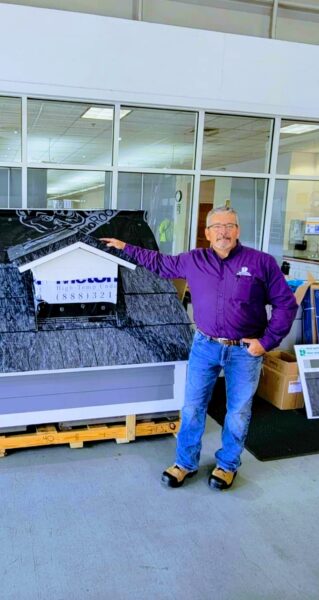Tariff war has local manufacturers eyeing a more Canadian focus
‘Any tariff on incoming or exporting material will directly affect the bottom line…’

People from the Kawartha Lakes business community say the Canada-U.S. trade war is creating waves of uncertainty for their companies which have longstanding relationships with clientele south of the border.
On Feb. 1, U.S. President Donald Trump signed orders imposing 25 per cent tariffs on nearly all imports entering the U.S. from Canada and Mexico, launching the trade war. Then-Canadian prime minister Justin Trudeau responded with 25 per cent tariffs on U.S. exports to Canada.
Businesses say they’re feeling the pinch and are concerned about the future of their relationships with customers in the U.S.
Ideal Roofing is headquartered in Ottawa and has a manufacturing facility in that city as well as facilities in Brampton and Moncton, N.B. The family-owned business, which manufactures metal roofing and siding, has clients in Kawartha Lake. It was founded 96 years ago.
Tariffs on U.S. imports of steel and aluminum from Canada and other countries went into effect March 12. This has a significant impact on a company specializing in metal roofing, said Ideal Roofing product specialist Brad Whitley.

Whitley, who is based in Kawartha Lakes, said about 25 per cent of the company’s business is in the U.S. The company has been selling products there for about 60 years.
“Being a nearly-100-year-old, fourth-generation company, there have been a lot of relationships established and maintained, and this really affects that,” Whitley told The Lindsay Advocate.
Whitley added that the trade war will likely mean Ideal Roofing will be forced to focus on increasing business on the northern side of the border.
“Clearly, we’re going to have to concentrate more in Canada,” he said.
The U.S. imports more steel from Canada than any other country. In 2024, there were six million tonnes of steel imported by the U.S. from Canada, according to the U.S. Department of Commerce.
Philippe Laplante is vice-president of sales and marketing for Ideal Roofing. On Feb. 25, two weeks before 25 per cent tariffs on most imports to the U.S., including steel and aluminum, went into effect, Laplante was interviewed on the 580 CFRA radio show Ottawa Now with Kristy Cameron.
Laplante expressed concern on the show about the impact the trade war could have on the company, noting the uncertainty surrounding tariffs was already creating rough waters to navigate.
“It has been tough; the U.S. market has seen a lot of increases due to this, so the products themselves are rapidly going up (in price) in the U.S. because of the uncertainty and because of these possible tariffs,” he said.
Laplante added that the company’s February sales were “greatly impacted” by this uncertainty.
“Uncertainty is never good for any business,” he said.
The Lindsay Paper Box Co. was established in Lindsay in 1951. The company manufactures custom folding cartons as well as blister and skin packaging for clients across North America.
Company owner Greg Fierheller said Lindsay Paper Box exports approximately 35 per cent of its products to the States. He said the company is “very concerned” about the impact of 25 per cent tariffs on its U.S. exports.
“(Tariffs) directly affect our competitive ability and jeopardize the decades-long relationships we have cultivated with our U.S. clients,” Fierheller said.
“Any tariff on incoming or exporting material will directly affect the bottom line for our local clients and our entire customer base.”
Given that the trade war is in its infancy, Fierheller said there’s a lot of uncertainty surrounding what its long-term impact will be. However, at the moment, he said the best option for Lindsay Paper Box to mitigate the negative impact of tariffs is to continue utilizing its Canadian suppliers as much as possible and continue working to expand its Canadian customer base.
Looking ahead, Fierheller said he hopes the U.S. will abide by the United States-Mexico-Canada Agreement (USMCA), but he adds he’s skeptical, given Trump’s mercurial approach to trade with America’s neighbours since starting his second presidential term in January.
“At this point, it does not seem as though there is willingness to adhere to a trade agreement that is formally agreed to and in place,” Fierheller said.
In an effort to help Ontario manufacturers wade through the effects of the trade war, the province is offering two programs to manufacturers: the Ontario Made Manufacturing Investment Tax Credit and Ontario Made.
The Ontario Made Manufacturing Investment Tax Credit is a 10 per cent refundable corporate income tax credit to help eligible companies receive a tax credit of up to $2 million per year to make qualifying investments in buildings, machinery and equipment for manufacturing or processing.
Ontario Made is an initiative that provides free marketing materials to help businesses in the province highlight locally manufactured goods.
At the federal level, the Canadian government is stepping in to help manufacturers that export to the U.S. The feds announced March 7 that Canada will be launching the Trade Impact Program through Export Development Canada (EDC). This initiative will deploy $5 billion during the next two years to help exporters find new markets and deal with challenges.
“In these uncertain times, supporting Canadian exporters is not just a policy, it’s a necessity,” said Mary Ng, minister of export promotion, international trade and economic development, in a statement.
“This investment ensures our exporters can continue to drive our economy, create jobs, and compete on the world stage.”




